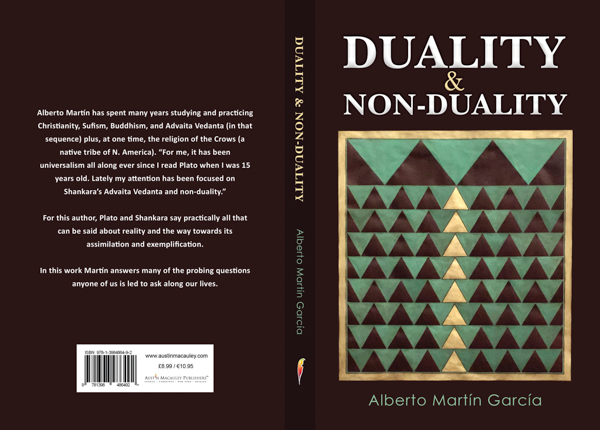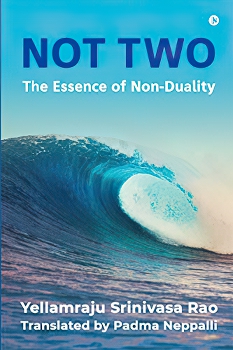A new book announcement with extracts from our regular contributor – Martin.

CONTENTS


A new book announcement with extracts from our regular contributor – Martin.



Peculiar Stories, Mora Fields
O Street Publishing, 2010, ISBN 978-0-9791416-1-4. (92 pages), Ages 6-10 and up.

Mora Fields Mora Fields has been an inquirer her entire life, although she didn’t always realize it, and translated her early wonderings about the nature of life into these stories of inquiry for children. She has long been a reader and admirer of the English philosopher/sage Douglas Harding. She co-authored a previous book called Aspects of the One: the 99 Names of God.
Continue readingI regard consciousness as fundamental. I regard matter as derivative from consciousness. We cannot get behind consciousness. Everything that we talk about, everything that we regard as existing, postulates consciousness.
– Max Planck
(X): Non-dualism is not something that can be understood in any formulation of words, and at best one can approach it conceptually only perhaps by means of negation, meaning by specifying what it is not.
A1. All doctrines and teachings are necessarily couched in language, which is a system of symbols. All concepts are just pointers (e.g. ‘pointing at the moon’), including those of Nonduality (ND). So it is not only negation — I think you will agree. I also referred myself to superimposition followed by rescission as a method of gradual understanding taught in Advaita Vedanta. The final end is doing away with language once final understanding has been reached, that is, once there are no further doubts or questions.
Continue readingWho would win in an argument between Ramanujacharya and Shankaracharya?
As non-duality can be said to go beyond, and at the same time enclose duality within itself, we can also say that Shankara, being a non-dualist philosopher, goes beyond and ‘incorporates’ Ramanuja, that is, the latter’s philosophy (it has been said: a jñani understands a bhakta, not vice versa).
Ramanuja took the ego (psychological self) as being the Self, an error for an Advaitin. For the former, destruction of the ego (“me”) will thus entail the destruction of the Self. For an Advaitin, the ego or subtle body (mind, senses, and vital breath) dissolves when the body dies – not so awareness or pure consciousness.
From the viewpoint of Advaita Vedanta, ‘consciousness’ is another name for reality/being/existence: all there is or that can be (all possibilities of existence). Neither ‘subject’ nor ‘object’, it annihilates this (mental) division, as well as sublating all concepts.
Or, as Francis Lucille, a well-known teacher wrote: ‘Simply put, non-dualism is the hypothesis that reality is non-dual, that there is only one single reality which is the substance of all things, of all phenomena, both mind and matter. If that is true, it follows that the reality of our ordinary consciousness, meaning whatever is really perceiving these words at this moment, must be this non-dual, single, and universal reality.’
Shankara said:
‘An enlightened person, after his death, does not undergo a change of condition – something different than when he was living. But he is said to be “merged in Brahman” just due to his not being connected to another body.’ Quoted from ‘The Method of Early Advaita Vedanta’, Michael Comans.
Q: You wrote: We say ‘neti, neti’ not just to all of the presumed objects in the world, and to our body and mind, but also to the ahaMkAra ‘I’ that relates to this body-mind. The ‘I’ that is able to do this is the ‘witness’. It is the ‘negator’ that is left when everything else has been negated.
You also wrote: The ‘witness’ also has to be negated intellectually …(Answer to Q.402)
The first passage seems to imply that the witness cannot be negated, but that contradicts the second quote. Could you please clarify?
A: The point is that the entire teaching of Advaita necessarily takes place in vyavahAra. The ‘neti, neti’ practice is negating all of names and forms with which we identify and saying that it is the ultimate ‘identifier’ that we really are. But an ‘identifier’ is still a vyAvahArika concept. We have to recognize this fact (intellectually) and ‘as if’ negate the idea of witness too. Ultimately, the intellect has to ‘let go’ of everything, including ideas about Brahman and Non-Duality, in order to appreciate the final reality. But we know that this is still an intellectual exercise in vyavahAra, and (in vyAvahArika reality) we cannot negate the witness!

On the face of it, this is a well-written and readable book, ideally suited for a new seeker. E.g. the sections on ‘The Illusory Nature of the Separate Self’ and ‘Knowledge Dispels Ignorance’ are excellent.
Unfortunately, should any reader accept everything that is written at its face value, they will come away with some serious confusions. In what follows, I apologize in advance for some of what may seem to be harsh criticisms, but my own perception of these points is heightened as a result of spending the last year writing my own work on ‘confusions’ of precisely this sort.
The author uses the traditional teaching method of adhyāropa-apavāda but it is not made clear when what is being said is only provisional. Also, there are very few references to the source of what is being presented. (And one of those that is provided doesn’t exist!) There are many places where the author writes ‘as Shankara said’ but scarcely a single pointer to where he said it. There are numerous places where I, as an informed reader, need those references before I will even consider what is being said to be credible!
Continue readingAfter the two long discussions on this fascinating topic, I would like to offer the following as my final word on the subject (hopefully!):
The world is brahman – sarvam khalvidam brahma. So we can say that the cause of the world is brahman (and shruti does say this!). The cause is not ignorance. It is because of ignorance that we see the world as separate objects and people but that is not the same thing. Yes, we superimpose ‘things’ upon the non-dual reality. That is adhyAsa. But that is not the ‘cause’ of the world. Ignorance is absence of knowledge and the world could not arise from an ‘absence’ or nothing. Brahman is the cause and, for the sake of ‘explanation’ we posit that it does so via the power of mAyA. Even so, the world is nothing other than Brahman, since Brahman is both material and efficient cause.
Ignorance is not the cause of the world; it is the reason that we fail to realize that the world is Brahman. When that ignorance is removed, the realization dawns; but since it had nothing to do with the appearance, the world does not disappear when the ignorance goes. If the (appearance of the) world had not been there to begin with there would have been nothing for us to superimpose upon. It was and remains mithyA – dependent upon Brahman for its reality. When we gain Self-knowledge, what goes away is the ignorance, not the world.
Many of the current popular Non-dual teachers in the West, both from the USA and UK, seem to present a version of Advaita which is a mix of Shankara’s philosophy and Kashmir Shaivism. Their audience, who are usually less inclined to accept the requirement of a prolonged prior mental preparation (called the “Purification of the mind” (cittasuddhi) insisted by the traditional Advaita, savour this mix essentially for two reasons. One is that the Karma theory and the concept of rebirth which are very much an integral part of Shankara’s teaching gets rarely mentioned by the Western teachers. The other is that the Western tech-savvy mind appears to prefer a world that is One seamless Whole without divisions (a–dvaita) as the Reality in preference to a world which becomes totally apparitional as Shankara avers, post Self-realization.
A recent publication titled “Liberation and the World- in Advaita Vedanta and Pratyabhijna” by Klara Hedling** attempts to pin point precisely where the Advaita philosophy of Shankara differs from the Non-dualism of Kashmir Shaivism. An excerpt from it follows: Continue reading
M. Thank you for your well-argumented comment. Empirical science is one thing; philosophy another. Other than Monism there is Non-duality (‘not-two’). Ultimately there is no essential distinction between matter and consciousness which latter, logically and epistemologically, is prius; equally, no distinction between subject and object, observer and observed. The existence and reality of consciousness, which is independent of all phenomena, doesn’t need a proof. Continue reading
You raise a lot of questions, and I will go about them one by one, hoping you won’t mind.
1). Everything is a belief until the belief is replaced by a conviction based on an experience – or experience-knowledge – , the experience (intuition + reasoning) needing no proof.
2). Consciousness and intelligence are prerequisites for understanding what any concept (e.g. ‘matter’) means. Without consciousness, nil. That is why it is logically, ontologically, and epistemologically prior to any enquiry or investigation. Can this be contested?
3). When writing or reading, are you and I conscious? Is there need of a proof for this (which I call reality or fact)? The fact of being conscious as a living being is irrefutable. Another question is whether it is the brain, or consciousness/mind, that which is causal in this ‘binomius’ – subject-object (thinker-thought). Continue reading →